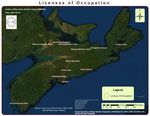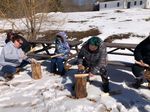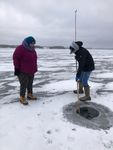March 2021 HISTORY MATTERS: BEFORE THERE WERE RESERVES - Mi'kmaq Rights Initiative
←
→
Page content transcription
If your browser does not render page correctly, please read the page content below
March 2021
HISTORY MATTERS: BEFORE THERE WERE RESERVES...
Before there were reserves there were Licences of Occupation. While the non-Mi’kmaw population of Nova Scotia remained
low, Mi’kmaq could continue to live their lives with little conflict with neighbours. That changed at the end of the American
Revolution when tens of thousands of Loyalists poured north into Nova Scotia in the early 1780s. Conflicts arose but the
Nova Scotian government could not protect harvesting areas and rivers for Mi’kmaq because the land granting regulations of
the time did not permit the creation of reserves. Instead, the Nova Scotian governments used “Licences of Occupation” to try
to protect Mi’kmaw lands, particularly in areas that Mi’kmaq demanded protection from the incoming Loyalists.
So when were these Licences issued and where were these lands?
1782: “Philip Bernard, Solomon Bescoloon and Thomas Ambroise of the
1783: “ Joseph Copp Chief over the
Tribe of LaHave Indians” were awarded a Licence of Occupation to 550 acres on
Tribe of Indians of Sheet Harbour
the East side of St. Margarets Bay. Unlike the later Licences, the St. Margarets Bay for himself and his Tribe” was
Licence did not specifically mention that the Mi’kmaq were to also have hunting awarded a Licence of Occupation to
and fishing rights. Fish and Hunt over 11,520 acres
around Sheet Harbour and provided
that “all persons ... Abstain from
interrupting or disturbing the
said Tribe in Fishing and hunting
on said Tract of land.” While a draft
of this Licence of Occupation also
stated the Mi’kmaq of Sheet Harbour
were to have a right to occupy the
1783: The only Licence of Occupation on Cape Breton was awarded to
tract of land, the version recorded in
“Lemable Janot Chief of the Cape Breton Tribe of Indians”, to occupy their
the Crown Lands office did not
settlements in the West Bay area, together “with a Right to Hunt in the Country
specify a right to occupy as well as a
Round & to Fish in all the Rivers & Lakes near the Hunting Ground,” particularly
right to harvest.
in the Bras d’Or.
1783: In the Antigonish area, a Licence
of Occupation was awarded to Anthony
Barnard, Chief of the Antigonish Mi’kmaq,
“to Occupy Undisturbed the several Villages
and Tracts, they have improved and
settled upon” along Antigonish Harbour
and St. Georges Bay, “with Liberty of Hunting
and fishing as Customary”.
1783: Erne Courtes, Chief of the
“KezousKebougwacke,” and the River Philip
Mi’kmaq were granted a Licence of
Occupation to the lands “they have settled
upon and been accustomed to Occupy”
on the southwest shore of River Philip,
“with Liberty of Fishing and Hunting
as Usual”.
More on the back page!Page 2 KMK Newsletter
Highlights from your KMK departments
Cultural Tourism
Thanks to those of you who joined us in last month’s Virtual Community Engagement Session which focused on
the work done to date to advance Cultural Tourism. Attendees learned about some of the challenges with drafting
Authenticity Guidelines, especially in terms of clearly defining what this means and how to value the culture
without exploitation. Key findings from the interviews reiterated the diversity of community stories and
experiences and the importance of connecting experiences and products directly to community. The session
raised some important questions that still need to be explored and which will be added to both the draft
guidelines and the community survey that will be coming out very soon. This included discussions about
Mi’kmaq and non-Mi’kmaq collaborations, along with the opportunity to engage with the province and
municipalities to ensure Mi’kmaq are visible and reflected across the geographical and cultural landscape of the
province. It also included an approach to dealing with cultural appropriation and having mechanisms in place to
address this. Many of those who participated in the community session were inspired by the possibilities that
Cultural Tourism provides to our communities and eager to move this important work forward.
Consultation - Parks Canada
We have been coordinating on a number of Parks
management plans, and management statements.
Based on our recommendation for Mi’kmaq
involvement on the Sable Island Sweat Bee recovery/
action plan, discussions are now taken place. There is
also a chance for youth involvement, which may result
in some youth being able to visit Sable Island.
Both Parks Advisory Committees met-up virtually in
January. We discussed matters which affect the
Mi’kmaq, and provided advice on Park site planning
and operational processes. Right now, Fortress of
Louisbourg National Historic Site is looking at the
possibility of a non-personal media exhibit on
enslavement. There is no evidence that suggest the
slaves at the Fortress were Mi’kmaq, but there is
documentation of Indigenous slaves being brough in
over ships.
Nova Scotia Power Update
The Gaspereau Working Group got started back up
this month as the Capacity agreement with Glooscap
was accepted and approved. A day of Archaeology is
in the plans to provide a cultural perspective on
archaeology to the staff within NSP that work on the
files. We are still moving forward on the Tusket and
Mersey files and hope that an agreement can be
reached soon with respect to security and other
issues of concern. The Wreck Cove Hydro Penstock
Project has been deferred until 2022 as permits have
not been received to date and the Annapolis
Generating Station will be decommissioned in the
upcoming future.KMK Newsletter Page 3
GIS Update
This month our team met with CMM to discuss Indigenous Protected and Conservation areas and data. Currently,
the GIS discussions have been focused on a harvest block being harvested and georeferencing an image detailing
a harvesting area. A table was created showing archaeological sites containing past settlement information and
historical use points with proximity and directions to certain archeological sites. Also, the team has been
conducting research on wetlands data, and the 2015 Ecological Land Classification.
Energy and Mining
This past month, we have had a new Energy Advisor take over
responsibilities for this department! Patrick Butler moved from the
Consultation Department to the Energy Department when our
former Energy Advisor, Derek, moved onto a new organization. So
far Patrick has been busy learning the ropes and has had meetings
with communities to hear from them.
Currently Patrick is working with Paqtnkek on Highway 104, as
well as with Acadia on the Mersey area. He has also been in touch
with NFSolar to learn more about their recent work installing solar
farms in several Mi’kmaw communities in Nova Scotia.
One of the other major items that we are working is the potential
exploratory testing in the Cape Breton Highlands. The Assembly of
Nova Scotia Mi’kmaw Chiefs has informed the province that they
are opposed to exploration in the Cape Breton Highlands as they
are concerned about the impact to moose and Atlantic salmon in
connected bodies of water. The Department of Energy and Mines
has informed KMK that they will go back to regulators with this
information and follow up with the Mi’kmaq of Nova Scotia.
MKK Update
The MKK Assessments and Foster Care Working Groups have
wrapped up for this fiscal year, and the MKK team is happy with
the progress that was achieved this year. We’ve had many good
discussions about the issues for assessments for child protection
and foster care, and we’re hoping to continue these discussions
next fiscal.
These working groups are actively helping to write the policy
manual for the Mi’kmaw Child Welfare Regime, and the topics
discussed in these working groups are helping us to think outside
the box to support Mi’kmaw children and families.
MKK’s final Systemic and Structural Barriers working group
meetings also wrapped up for the fiscal year. The goal of these
meetings was to narrow the focus to the short-term as well as the Above: Our Youth Coordinators have been holding
long-term with an emphasis on prevention and utilizing community “On the Land” sessions with youth from our
resources. communities. Here they talk about Governance as
well as receive some land-based teachings!
We appreciate the input of our working groups tremendously!KMK Newsletter Page 5
History Matters: Before There Were Reserves...
(continued from the front page)
1783: On the other side of Cumberland County, a Licence
1783: In Halifax County on Shubenacadie Grand of Occupation was granted to “John Baptist of Pitch Bourn, Chief
Lake, a Licence was granted to Jack Pemmenwick, of the Macan Tribe” for Baptist and his people to “Occupy the
Chief of the Shubenacadie of “Land sufficient for lands they have settled on the West side the River Macan Towards
Nine families (being his Children)”. The land was the Head of the River, nearly where the Tides Meets and stops the
not the present Shubenacadie Grand Lake IR13 but Fresh Waters of the River”, together with” free Liberty of Fishing
at the “Northern side the River shubenaccadie, at in the said River and the River Napan & to Hunt in the Woods
The Point where the Great Lake, Discharges itself & Adjacent these Rivers.”
Extending on the Great Lake and the said River”.
The Pemmenwicks were also assured they would
have “Liberty of Hunting & Fishing in the Woods, 1783: In Pictou County, Chief Paul Chachegonouet and the
Lakes & Rivers of that Vicinity”. Pictou Mi’kmaq were awarded a Licence of Occupation for lands
they occupied on Sutherlands River and around Merigomish
Harbour “with Liberty of Hunting & Fishing the Woods, Rivers and
Lakes of that District.”
1783: In Colchester County, Paul Pemmenwick and and the
Mi’kmaq of “Cobequid & Shubenacadie” received a Licence of
Occupation in Middle Stewiacke “with free Liberty of Fishing and
Hunting in that District”. When CMM and the TARR Centre filed
a Specific Claim with the federal government for compensation
for this lost land on behalf of Millbrook and Sipekne’katik Bands,
the claim was rejected – with no reasons given.
1784: Paul Morris was awarded a Licence of Occupy
lands at Sambro and “Also to Fish and Hunt, not
interfering with any Inhabitant; and no person to
molest him.” This land became the Sambro Reserve
which surrendered in 1919 and became part of the
1919 Surrender Claim of Millbrook and Sipekne’katik
Specific Claim which was settled in 2020.
1786: In an unusually brief and
undescriptive Licence of Occupation, Charles
Alexis and the Mi’kmaq of Cape Sable (SWNS)
were awarded “A Licence for the Indians Bearers
to occupy their lands and usual Hunting Grounds
unmolested”.
Unfortunately, virtually none of these lands remained protected for Mi’kmaq to use and occupy. With little government
will to enforce the Licences, Mi’kmaq were ultimately driven from their settlements and from their hunting grounds
and fishing stations. It was not until 1820 that first reserves, as we know them today, were designated. From the 1780s
until the 1820s Mi’kmaq were increasingly denied use of their own lands and waters. Even after the Crown began
designating reserves in Nova Scotia, Mi’kmaq were denied access to resources and faced immense hardship.
www.mikmaqrights.comYou can also read



























































